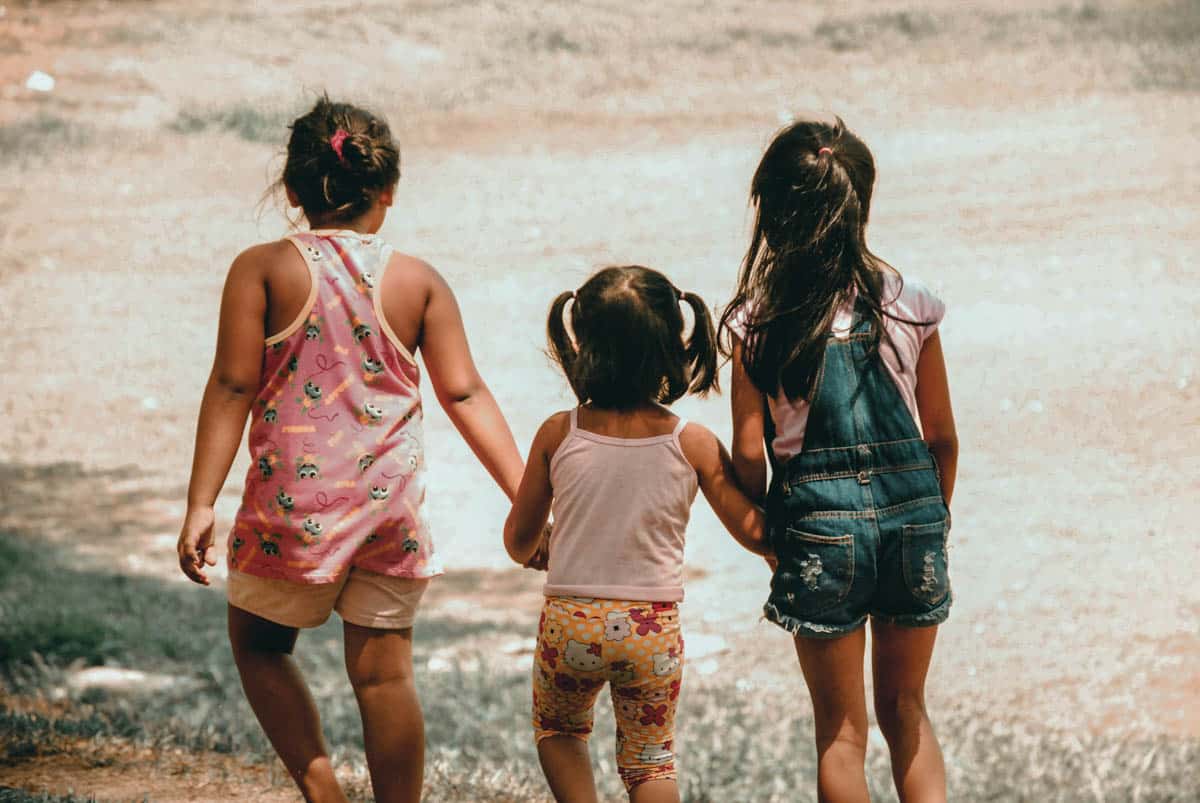
Children should not be put on diets. Children should not be told there is something wrong with their bodies. The harm that is being done to our children’s psychological and emotional health because of untested interventions to the “obesity epidemic” needs to stop.
This month, Weight Watchers announced that they will be providing free memberships this summer to 13-17 years olds, accompanied by a parent/guardian, as part of a marketing plan to grow their revenue to $2 billion by 2020. As a Registered Dietitian that specializes in eating disorders and a mother of three children, I have very strong negative feelings about this announcement. You may find this confusing. I’m a nutrition health professional and many people view Weight Watchers as a program that has helped a lot of people. You may wonder why I don’t think that offering this free service to teenagers isn’t a helpful thing. “The more health messages that can reach people the better. Right?” “If a child is fat, why not help them with their nutrition, Anna?,” you may ask. It’s okay to have all of these questions and my view may be confusing because it is not that of the mainstream culture. However, from where I sit, I see the full harm weight loss programs cause people and I don’t want that for another generation.

Weight Watchers’ plan to directly market to teenagers will cause our children harm. It will set up children to enter into yo-yo dieting and/or develop eating disorders. Weight Watchers’ plan is another program falsely promoting health that will cause our children emotional pain and will have a negative impact on their health. I add this to the list of other untested “obesity interventions.” We are experimenting with our children. Society has tried BMI report cards, good food/bad food nutrition lessons directed to children, fat shaming at pediatricians’ offices, food diaries in health class, and now taking children to Weight Watchers for “free.” The tactics we are using to solve the “obesity epidemic” are like using a sledge hammer to drive a nail on a craft project. It’s not at all the right solution to the problem and there is much collateral damage. Unfortunately, our children’s wellbeing is that collateral damage.
Many of my clients have explained that going to Weight Watchers or a diet program with their parent was a significant event in the development of their eating disorder. Before the first word is uttered or the first person steps on the scale, harm is caused when a parent takes a child to a place called Weight Watchers. When a parent takes a child to a facility that focuses on weight, the message to that child is something is wrong with you and you need to fix it. One study showed that when children hear they are too big, they feel flawed in many ways including perceived intelligence and perceived physical ability (1). We know that when parents feed their children in a restrictive way, children eat more and gain more weight than predicted (2). There’s something primal at work if the person that’s taking care of me is limiting my food. That conflicts with my basic need to make sure I’m going to get enough to survive. This isn’t conscious, but it’s a good example of an intersection of our emotions and food. It’s really important how parents feed their children and talk about weight. When I hear from a client, “And then my mother took me to Weight Watchers when I was 14.” I think about that 14-year-old and the impact it had for a parent to send this message to a child at such a young age.

In addition to the emotional effect, I’m further concerned about the health risks to adolescents who will be taken to Weight Watchers. Research has shown that adolescents that diet are at increased risk for binge eating, self induced vomiting, laxative use, and diet pill use at 5 year follow-up (3). This same study showed that adolescents that diet actually gain more weight. Our bodies are programmed to survive in times of famine. When we restrict our intake our metabolic functions adjust so that when more food is available we store fat more effectively and thus regain the weight quicker than if we had not dieted. When a teenager starts a diet at age 14 studies predict that at age 19 they will be heavier than if they hadn’t dieted. This is good for Weight Watchers; they will start our children at a younger age and get them hooked. The teenagers will lose the weight, because diets “work” in the short term. This weight loss will be coupled with praise and a temporary positive feeling. However, the weight will return and along with the weight gain comes shame. A fundamental principle of diets is that it’s the dieters fault that the weight has returned, even though there are no longitudinal diet studies that show sustained weight loss as a result of a diet. The shame can drive sneak eating, binge eating or other disordered eating behaviors. The young, now paying, customers will return for more, hoping they will do it “right” this time and searching for that positive feeling again. This model is not unlike giving drugs or cigarettes for free to first time customers.

So, what are we to do? We all ultimately want health and well-being for our children. I suggest the following:
- Focus on addressing food deserts and putting our public health efforts towards food security and better quality food for our children. Recent studies show that food insecurity is a significant predictor of eating disorder pathology (4). Low income individuals don’t need a Weight Watchers meeting, they need access to enough, affordable, and better quality food.
- Focus nutrition education towards parents, not children, with a focus on feeding children well at a young age. Parents need evidenced-based tools, such as Ellyn Satter’s Division of Responsibility in Feeding, to foster healthy behaviors and positive relationships with food. Nutrition education needs to have a focus on behaviors not weight. We need to educate pediatricians, health educators, and laypeople about weight-neutral approaches to health and family feeding rather than the current model that focuses on weight as an outcome. Some children have fat bodies, and some children have thin bodies. No matter the size of a child’s body, children deserve to be fed and cared for and taught (through modeling) how to take care of their bodies. Parents: Look at the resources on the Ellyn Satter Institute website or meet with a skilled Registered Dietitian who can support you in family feeding.
- Develop age appropriate nutrition education and media literacy in schools. Our current nutrition education, directed to young children is not age appropriate. Young children are concrete thinkers and cannot comprehend and implement the abstract concepts of nutrition and health. For more sensitive children, they may take these messages, apply them in a concrete way and this may be the trigger of an eating disorder. Older children, middle school age and up, have more abstract thinking and can begin to learn about nutrition and taking care of themselves. This age appropriate nutrition education needs to be weight neutral and include concepts like biological diversity. The Body Project is a body image curriculum that is evidenced based and has shown to decrease incidence of eating disorders. I call for Weight Watchers to put their money where their mouth is and sponsor professionals to become Body Project facilitators in schools.
- Support parents in helping children have a positive relationship with food and their bodies. Currently, our culture fosters fear in parents about children’s weight and sends the message that parents should do all they can to keep their child from having a large body. Parents need to understand about weight gain in puberty, body diversity and what to do if a child expresses concerns about their weight.
- Provide appropriate support for parents. If a parent is concerned about their child’s weight, there needs to be appropriate support, not a weight loss plan that causes harm. If a child’s rate of weight gain unexpectedly increases and veer’s off–up or down–of their predicted growth curve, it’s not something to be ignored. A physician or Registered Dietitian can help a parent assess if the child’s growth is consistent with his/her growth pattern. Children’s weight should not be compared to anyone else’s except their own growth history. If it is clear something is interfering with predicted growth, a parent needs to meet with a dietitian that specializes in family feeding who will support the parents in determining what may be getting in the way. I recommend that for adolescents and children, at least that first visit, and ideally all of the visits, needs to be just the parents meeting with the professional. Most of family feeding interventions can be done by the parents, and the child does not need to receive the intervention first hand.
- Most of all, I encourage parents to model body acceptance and focus on all the wonderful things bodies do, not what bodies look like or weigh. Children learn about how to view their bodies by how the adults around them talk about bodies. Say positive things about your own body! Focus on a child’s qualities that do not have to do with appearance, like strength, speed, agility, rhythm, wittiness, flexibility, intelligence, warmth, silliness, or courage.
Currently, there are not enough resources available to everyone to assist in the complexities of nutrition and eating behaviors. This is a problem. But the solution is not taking teenagers to Weight Watchers. We need to collectively put our energy into resources that support weight-neutral approaches to health and stop directing harmful, untested weight loss “solutions” to our children. I urge Weight Watchers to stay away from our children.
- Davison KK, Birch LL. Weight status, parent reaction, and self-concept in five-year-old girls. Pediatrics. 2001;107:46–53.
- Birch LL, Davison KK, Fisher JO. Learning to over- eat: Maternal use of restrictive practices promotes girls’ eating in the absence of hunger. Am J Clin Nutr. 2003;78:215-220.
- Neumark-Sztainer D, Wall M, Eisenberg ME, Story M, Hannan PJ. Overweight status and weight control behaviors in adolescents: longitudinal and secular trends from 1999 to 2004. Prev Med. 2006 Jul;43(1):52-9. Epub 2006 May 11.
- Becker, C. Middlemass, K. Taylor, B. Johnson, C. Gomez, F.Food insecurity and eating disorder pathology. Int J Eat Disord. 9. 1098-108X






This is SUCH a great article – thank you so much for this thoughtful message regarding their new app. I’ve shared your article on my social feeds. Thank you.
HI Nicole, We’re so glad you enjoyed Anna’s article. And thank you for sharing it!
I enjoy the report